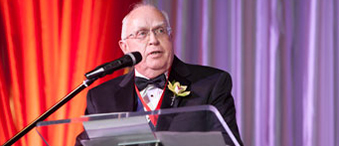Published: August 2023
For almost a year, the last thing Aida Attar remembered about a trip to her friend’s cottage on August 27, 2022, was they had stopped for snacks in Smith Falls. The next thing she recalled was waking up in the ICU of the Civic Campus of The Ottawa Hospital — two months later. She had been airlifted to our hospital’s Trauma Centre after suffering a seizure while swimming and then drowning as a result. While she had been resuscitated, this young woman was clinging to life and multiple specialty teams came together to help save her.
It was that late summer day in August when the 18-year-old university student was swimming in a lake with her friend, Taylor. Taylor has since explained to Aida that while they were together in the water, Aida started staring off. “I just suddenly looked off in the distance. I let go of the floating dock and I went under,” explains Aida. “My friend thought maybe I just dunked my head in the water to cool off, but then she grabbed me by the hair and pulled me up to the surface.”
What no one realized at the time was she’d had a seizure, which incapacitated her and caused her to go under.
From that moment, there was a flurry of activity to help revive the young woman. As Aida’s friend worked to keep her head above the surface, Taylor’s mom hurried into the water to help bring Aida to shore as she remained unresponsive. Meanwhile, Aida’s grandfather rushed away on an ATV to meet the paramedics, who had been called and were trying to reach the remote area as quickly as possible.
With help on the way, intense efforts continued to try to revive Aida, including CPR. But by this time, she started vomiting and her jaw was locked – so she was aspirating her vomit. It was a terrifying situation for everyone involved who were all desperately trying to help Aida.
The race to get lifesaving care
Paramedics rushed the young woman to the Perth and Smiths Falls District Hospital – still unresponsive. Aida’s family, many of whom have cottages in the area, quickly assembled to be by her side, including her aunt, Dr. Catherine Mann.
Thankfully, Aida was resuscitated and stabilized thanks to a team there led by Dr. Annelise Miller, but it was determined she needed specialized care, so the decision was made to airlift her to The Ottawa Hospital’s Civic Campus, home of the region’s only trauma centre for adults.
Her care in Smiths Falls was crucial to what would follow, according to Dr. Erin Rosenberg, an ICU physician at The Ottawa Hospital. “The Smiths Falls team did an absolutely incredible job of resuscitating her and getting her back. When she was transferred to us, her ARDS, or acute respiratory distress syndrome, was so bad that we couldn’t provide her with enough oxygen, even with the ventilator,” she recalls. “That’s why she needed to go to the University of Ottawa Heart Institute to be put on the ECMO.”
The team at Civic Campus, led by Dr. Akshai Iyengar, stabilized Aida and then she was transferred to the Heart Institute through the tunnels of the hospital. She was placed on the ECMO machine, and the wait began.
An ECMO (extra corporeal membrane oxygenation) is used to pump blood outside the body to a heart-lung machine that removes carbon dioxide and sends rewarmed, oxygen-filled blood back to tissues in the body. This machine allows the blood to bypass the heart and lungs, giving them time to rest and heal.
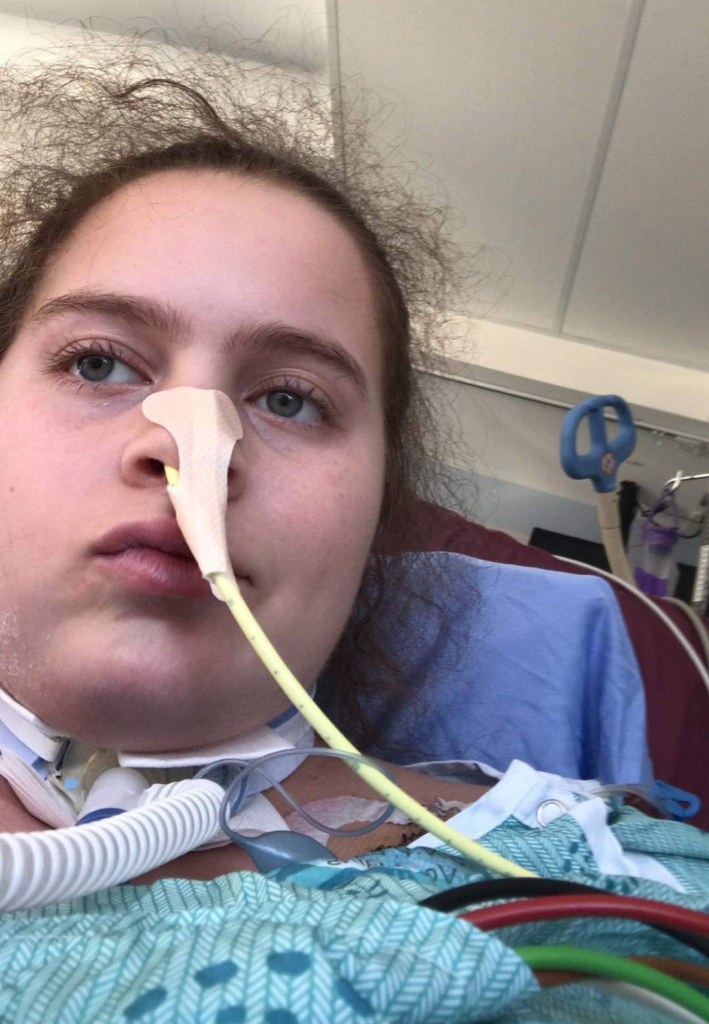
Aida remained on the machine, in a medically induced coma, for 35 days while her family endured an excruciating wait. “I’m grateful for all the work the Heart Institute did to get me on the ECMO and for not giving up on me over that time,” says Aida.
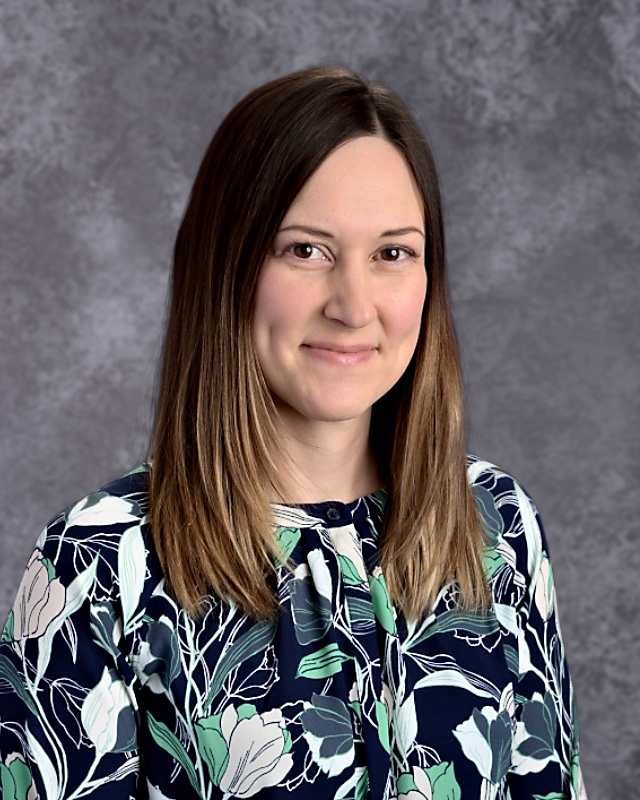
Youth was on her side
The first glimmer of hope was weeks later, in early October, when Aida was removed from the ECMO machine and returned to the ICU at the Civic Campus – she was still in critical condition. That’s when Dr. Rosenberg first met Aida.
“We see a lot of really sick people in the ICU, but what we don't often see is people who are as young as her. When we do, it can feel like the stakes are higher — there's an entire life ahead of her.”
– Dr. Erin Rosenberg
“We see a lot of really sick people in the ICU, but what we don’t often see is people who are as young as her. When we do, it can feel like the stakes are higher — there’s an entire life ahead of her.”
Aida’s age was also on her side. “I told her parents at the time, if she was 40 or 60, we would be having a very different conversation. I don’t think she would be here,” recalls Dr. Rosenberg. “What was on her side was the fact that she was 19 years old. Her brain and her body will be a lot more able to get through this compared to someone older than her.”
Aida’s family continued to be by her side – watching and waiting. “She had turned 19 during that time, and her body has been through so much,” recalls her aunt, Dr. Mann. “She’d been under anesthesia for five weeks. She was slowly weaned from that, and then her lungs had to get used to not being ventilated. So the care team took gradual steps to remove her from the ventilator. First, it was 30 minutes, then a couple of hours, and they continued that process.”
A weakened state and confusion
When Aida finally regained consciousness, she was weak after being in a critical state for two months. “I had no muscle tone. I couldn’t sit up on my own. I couldn’t walk. I don’t even remember being able to move my arms to scratch myself because I was so weak.”
“I couldn’t retain information. It was hard, but the team helped get me through those moments including one physiotherapist in particular, Michelle Cummings. She had a huge impact on my recovery.”
– Aida Attar
Aida’s immune system was also weak, and she was at risk of infections. Often, she would open her eyes and get very confused. “Any time she would sort of come to, or even if she didn’t have her eyes open, we would provide her some comfort as to what happened and where she was — even if we had to do that repeatedly,” says Dr. Rosenberg. “It was just like the first time she was hearing it again.”
Finally, Aida was able to move out of ICU and into what’s called AMA (Acute Monitoring Area) for about a week. There she had the tracheotomy tube, catheter, and feeding tube removed – she was able to start eating on her own again.
Although there were some signs of improvement and Aida was surrounded by an exceptional care team, she remembers going through many emotions. “I felt very alone. Even if my family had been there 23 hours and 59 minutes of the day, that one minute alone felt like a year. I was shy, and I didn’t understand what was going on. I couldn’t retain information,” explains Aida. “It was hard, but the team helped get me through those moments including one physiotherapist in particular, Michelle Cummings. She had a huge impact on my recovery.”
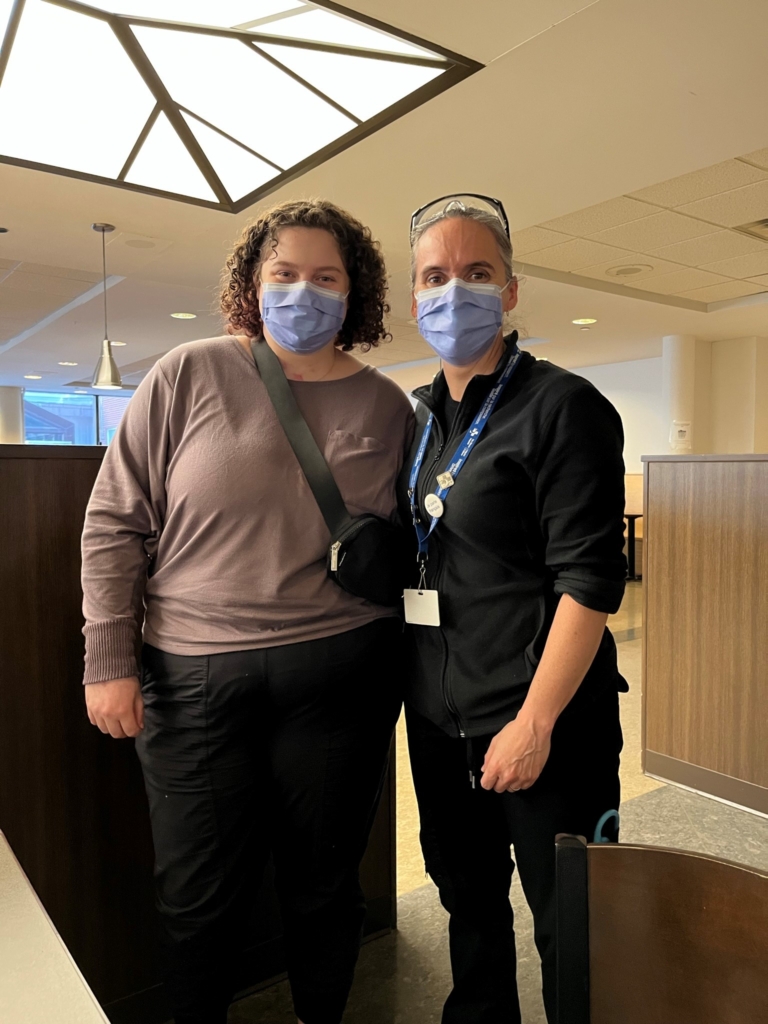
How our Rehabilitation Centre helps Aida’s recovery
The CAREN system
As Aida’s recovery continued, she started to understand the complexity of what her body had been through because of this traumatic experience. By mid-November, she moved to our Rehabilitation Centre at the General Campus – this would be another big step in Aida’s recovery.
The care in rehab was two-fold — to help both her body and her brain recover. Part of learning to walk independently again involved using the CAREN system, a unique 3D virtual reality system funded through community support in partnership with the Canadian Armed Forces. But because she had an anoxic brain injury, caused by a complete lack of oxygen to the brain while she was underwater, a big part of rehab was focused on treating her brain injury. “My memory was just shot — I couldn’t remember anything short-term,” says Aida. “My speech was mixed up. My brain was not braining, and it needed some help.”
Incredibly, after everything Aida went through, on December 8, 2022, she was able to go home. She walked out of the Rehab Centre on her own, and her memory continued to improve. It was a recovery beyond what Dr. Rosenberg expected.
“She actually exceeded our expectations in terms of how fast she would get better.”
– Dr. Erin Rosenberg
“I remember initially preparing her family to anticipate her being in the ICU until December and probably in the hospital longer than that. So, she actually exceeded our expectations in terms of how fast she would get better.”
Today, Aida is getting her life back on track — she’s stronger each day. She’s driving again, working in retail, and plans to return to Carleton University in the fall to continue her studies in neuroscience. “I had finished my first year of university before the accident. I worked as a research assistant in a neuroscience lab at Carleton in the summer of 2022. In fact, I was working on a traumatic brain injury project at the time.”
Deep gratitude for those who saved her life
While she doesn’t remember many details from the first half of her hospital stay, Aida is grateful for the team that gave her a fighting chance. “I would be dead if they hadn’t done all that they did. The doctors just worked so hard. I mean so many things went wrong. I had blood infections and allergic reactions — I was just a hot mess. They kept going — they didn’t lose hope or give up on me. It was the next level of care, and I don’t think I would have got through it without that.”
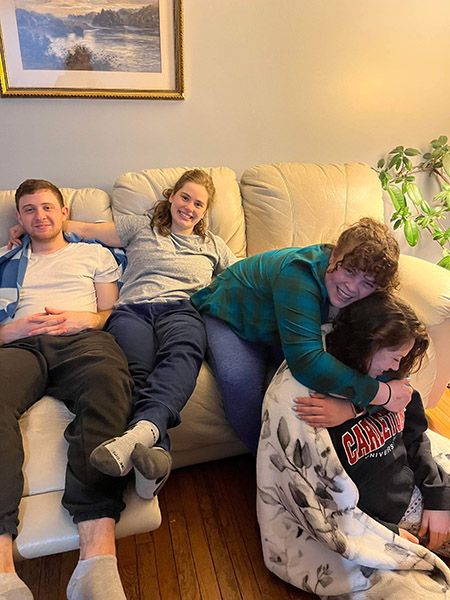
“The healthcare team works hard, and these people worked hard. We’re deeply grateful to everyone, in particular Drs. Iyengar and Rosenberg. It was traumatizing for our whole family and that team never gave up on Aida.”
– Dr. Catherine Mann
Every step of the way, there was exceptional care — something that’s not lost on Dr. Mann. “There were a whole bunch of incredible people and a couple that stand out. When Aida arrived at the Civic Campus, Dr. Iyengar was there, and he was devoted. Then Dr. Rosenberg was there for each day when Aida returned to the Civic’s ICU in October and so many others.”
That’s what inspired Dr. Mann, who was a physician at The Ottawa Hospital for 22 years, to make a gift to The Ottawa Hospital — a thank you to the team that saved her niece’s life. “The healthcare team works hard, and these people worked hard. We’re deeply grateful to everyone, in particular Drs. Iyengar and Rosenberg. It was traumatizing for our whole family and that team never gave up on Aida.”
For Dr. Rosenberg to see this success story is what she loves about her job. Not every story ends this way but when it does, it’s rewarding for the whole team. “Aida came back to visit in the ICU a couple of weeks ago, just to say hi to everyone. And everyone was so happy to see her — they remember her as a patient, all the nurses. I think seeing those success stories are really, really rewarding for us. And I think it’s why we do what we do.”
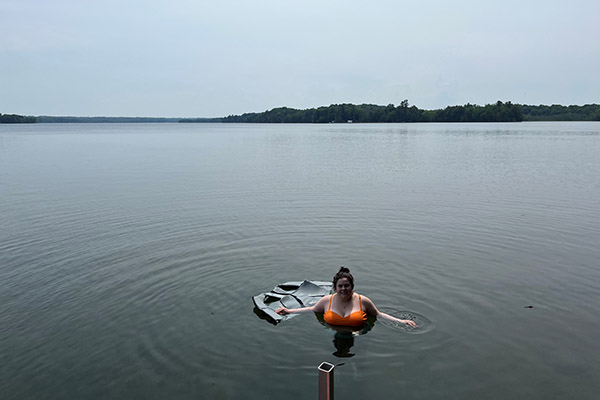
Stepping back into the water
In late May of 2023, Aida was visiting her aunt’s cottage and she went back into the water for the first time since the accident. As she felt the cold water on her feet and legs, memories started to flood back to her. “I instantly remembered when I was in the water with Taylor. It took me back to that day, and that was shocking because I didn’t think I would have remembered that.”
While she’s grateful to have her life back, there is still the unknown of what caused the seizure that day. Tests continue, but for now she takes precautions like wearing a lifejacket when swimming. “That piece is also hard for me. It’s hard to have gone through all that and not have an answer as to why this happened.”
But what she does know, is she wouldn’t be here if it wasn’t for each person who played a part in her recovery, and for that she’s grateful.



